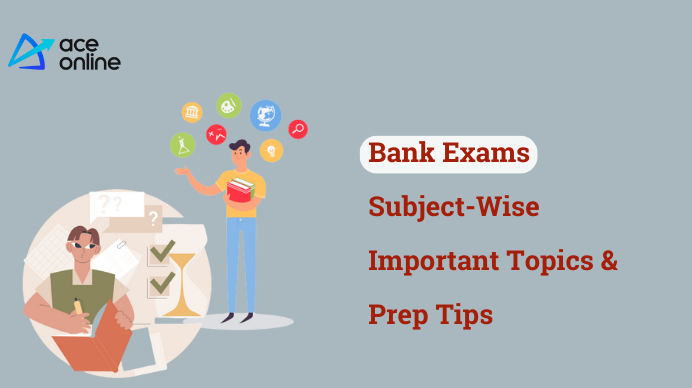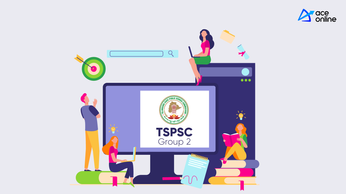
Bank Exams: Subject-Wise Important Topics & Prep Tips
To help you prepare effectively, this article will outline subject-wise important topics for bank exams, covering Quantitative Aptitude, Reasoning Ability, English Language, and General Awareness.
Bank exams are highly competitive and serve as a gateway to a promising career in the banking sector. Whether you're aspiring to be a Probationary Officer (PO), a Clerk, or a Specialist Officer (SO), a thorough understanding of the subjects tested in these exams is crucial. To help you prepare effectively, this article will outline subject-wise important topics for bank exams, covering Quantitative Aptitude, Reasoning Ability, English Language, and General Awareness.
When it comes to achieving success, only a few emerge as winners. The determining factor lies in understanding the significance of specific elements within the syllabus. Knowing what truly matters and what doesn't empowers individuals to make informed decisions, enabling them to strategize and prepare meticulously. This strategic approach ensures that success becomes an attainable goal.
Consequently, it is imperative to thoroughly comprehend the entirety of the syllabus before embarking on any examination. By thoroughly studying the syllabus, individuals can effectively internalize the subject matter. Crafting a comprehensive preparation plan is essential to manage time efficiently and complete the curriculum successfully.
Quantitative Aptitude
Aptitude Preparation Tips
1. Arithmetic: This forms the backbone of the Quantitative Aptitude section. Focus on topics like Percentage, Ratio and Proportion, Time and Work, Time and Distance, Average, Simple and Compound Interest, and Profit and Loss. These concepts are regularly tested and are essential for solving complex problems.
2. Number Series: Practice spotting patterns in number series questions. Familiarize yourself with various types of series like prime numbers, squares, cubes, and arithmetic/geometric progressions.
3. Data Interpretation (DI): DI questions are based on graphs, tables, and charts. Work on your speed and accuracy in interpreting data to answer questions related to it. Topics include Bar Graphs, Pie Charts, Line Graphs, and Tabular Data.
4. Quadratic Equations: Master solving quadratic equations using methods like factorization, the quadratic formula, and completing the square.
5. Simplification/Approximation: These questions test your ability to quickly perform calculations. Practice BODMAS (Brackets, Orders, Division and Multiplication, Addition and Subtraction) rules.
6. Data Sufficiency: Learn to determine whether the given data is sufficient to answer a question. This tests your analytical skills.
7. Quadratic Equations: Solve quadratic equations using methods like factorization, the quadratic formula, and completing the square.
8. Mensuration: Topics like area, volume, and surface area of common geometrical shapes are frequently asked.
9. Probability and Statistics: Understand the basics of probability and statistics, including mean, median, mode, and standard deviation.
10. Data Sufficiency: Practice questions where you need to determine whether the provided data is sufficient to answer a particular question.
Reasoning
Reasoning Ability Preparation Tips
1. Seating Arrangements and Puzzles: These are frequently asked and require a lot of practice. Different types include linear and circular seating arrangements, floor-based puzzles, and scheduling puzzles.
2. Syllogism: Master the art of drawing logical conclusions based on given statements. Practice Venn diagrams to solve these problems.
3. Blood Relations: Understand family tree relationships and solve questions involving blood relations confidently.
4. Inequality: Questions based on relationships between elements using symbols like <, >, ≤, ≥, = are common.
5. Coding-Decoding: Learn various coding techniques and practice decoding to find patterns in given codes.
6. Direction and Distance: Understand how to navigate through directions and calculate distances.
7. Analogy: Improve your ability to draw connections between related words.
8. Alphanumeric Series: These questions involve a mix of letters and numbers. Identify patterns and sequences.
9. Statement and Assumptions/Conclusions/Arguments: Enhance your critical thinking skills by practicing these types of questions.
10. Data Sufficiency: Similar to Quantitative Aptitude, you'll need to determine whether the given data is enough to answer a question.
English
English Language Preparation Tips
1. Reading Comprehension: Improve your reading speed and comprehension skills. Focus on understanding the central theme, tone, and main ideas of passages.
2. Vocabulary: Enhance your vocabulary by learning new words regularly. This includes synonyms, antonyms, and idiomatic expressions.
3. Grammar: Brush up on grammar rules, including tense, subject-verb agreement, articles, prepositions, and conjunctions.
4. Error Spotting: Develop an eye for spotting grammatical errors in sentences.
5. Para Jumbles: Practice rearranging sentences to form coherent paragraphs.
6. Cloze Test: Improve your understanding of contextual vocabulary by solving cloze tests.
7. Fill in the Blanks: Understand sentence context to choose the correct word to fill in the blank.
8. Sentence Improvement: Enhance your sentence structuring skills.
9. Synonyms and Antonyms: Expand your word knowledge.
10. One-Word Substitution: Learn common one-word substitutes for phrases or expressions.
General Awareness
To excel in bank exams, it's essential to cultivate a daily habit of reading newspapers and diligently noting down critical information pertaining to general awareness. Mastery of current affairs spanning international, national, scientific, technological, and sporting events, notable personalities in the news, recent appointments, awards, conferences, and meetings is imperative. Moreover, it's advisable to regularly cross-reference self-made notes with available monthly publications dedicated to current affairs and general awareness. When embarking on your practice regimen, prioritize topics that carry the highest weightage in terms of marks and allocate more study time to them. Keep in mind that even if previous years' questions haven't touched upon certain subjects, there's still a possibility that questions might emerge from them in the future.
In conclusion, preparing for bank exams requires a holistic approach that covers the above-mentioned subjects and topics. Regular practice, time management, and a structured study plan are keys to success. Remember that consistency is crucial, and staying updated with current affairs is equally important.
Good luck with your bank exam preparation!
ACE Online Newsletter
Join the newsletter to receive the latest updates in your inbox.






